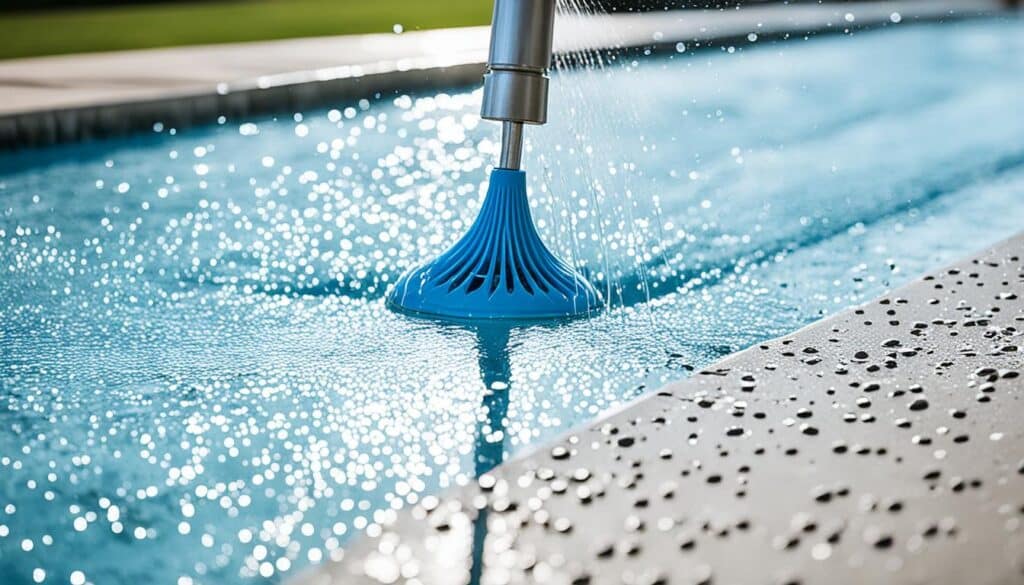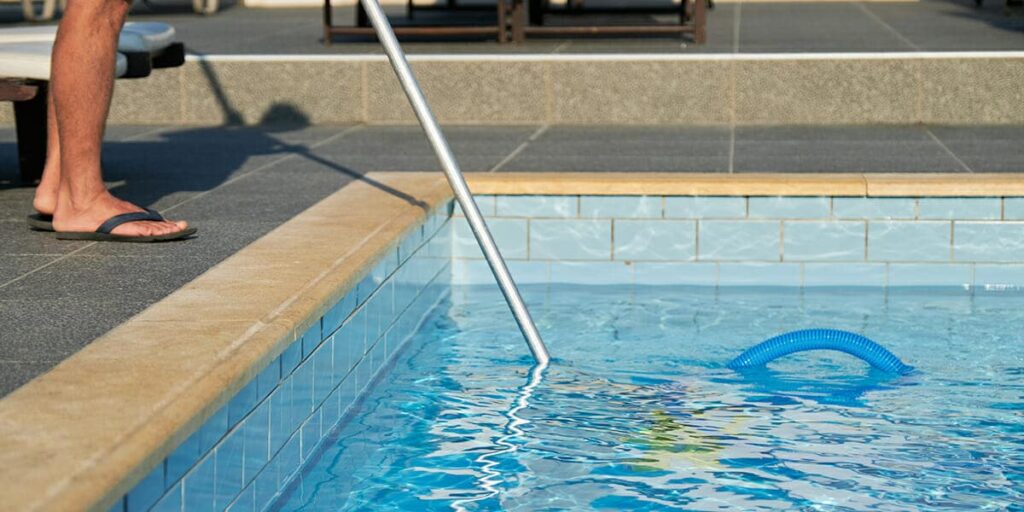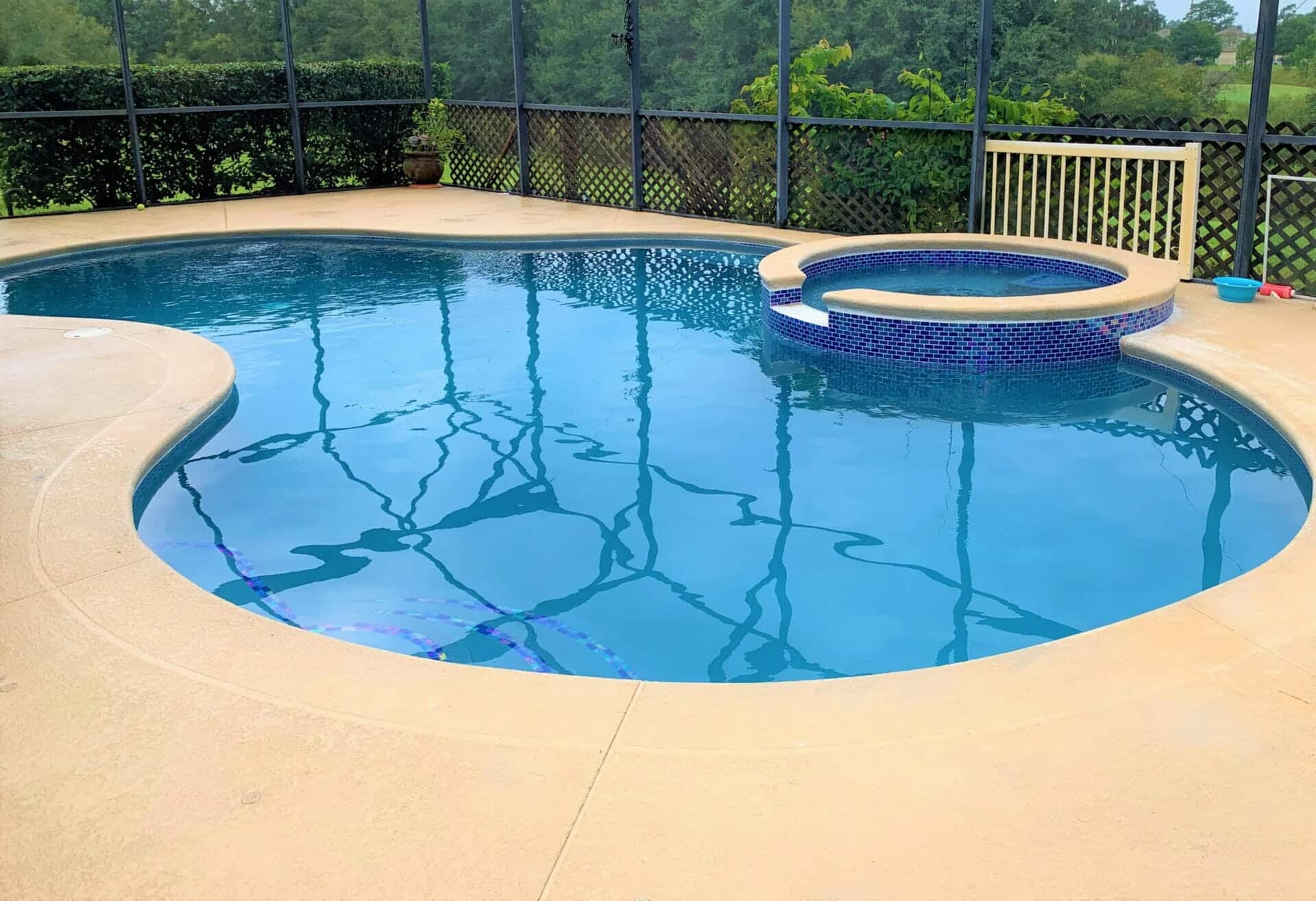When it comes to constructing or renovating a swimming pool, one aspect that we cannot underestimate is the role of pool tile adhesive grouts. These are essentially the bonding agents that attach the tiles firmly to the pool, and choosing the right one is crucial to the longevity and aesthetic appeal of our swimming pools.
Selecting the Right Grout for Pool Tiles
Tiles – thanks to their diverse colors, shapes, and styles – are an affordable and popular choice for both new pools and renovations. However, their installation involves more than simply sticking them on. It entails investing time and money in selecting not only the right tile but also the right pool tile adhesive and grout. Given the unique conditions of a swimming pool environment – near-constant water exposure, severe usage, regular maintenance, and chemical treatment (such as exposure to chlorine) – our chosen adhesive and grout should be waterproof, strong, and chemically resistant.

Application Techniques for Adhesives and Grouts
Have you tried figuring out the right swimming pool tile adhesive or grout for your pool tiles? Or do you wonder why some pools maintain their elegance while others quickly lose their luster? Read on to learn about these critical yet often overlooked elements of pool construction and maintenance.
Key Takeaways
- Pool tile selection and the use of appropriate adhesives and grouts significantly impact the aesthetics, durability, and longevity of swimming pools.
- The adhesive and grout should be waterproof, strong, and chemically resistant to withstand constant wet conditions, usage, and exposure to pool treatment chemicals.
- A poor choice of pool tile adhesive grouts can lead to complications such as discoloration, cracks, and even damage to the pool itself.
- Determining the best swimming pool tile adhesive and grout involves considering factors such as the pool’s location, tile type, anticipated pool usage, and personal aesthetic preferences.
- Maintaining a swimming pool’s aesthetic appeal and physical integrity involves more than just cleaning – we must also monitor the adhesive and grout condition and act promptly when we detect any issues.
Exploring the Essentials of Pool Tile Adhesives
Creating an enduring and attractive swimming pool goes beyond selecting the perfect tiles. The adhesive used in binding these tiles plays an integral role in ensuring longevity. Unlike in other settings, the choice of adhesive for pool tiles should be based on certain specific requirements, mainly due to the unique conditions around swimming pools. Here, we delve into the world of pool tile adhesive, exploring the importance of the choice, the differences between various types, and the beneficial role of epoxy in pool tile adhesion.
Why Adhesive Choice Matters for Pool Tiles
The choice of adhesive is as crucial as the tile selection itself. It goes without saying—the bond it forms needs to be not just robust but flexible, withstanding constant water pressure and a variety of chemicals found in treated pool water. In essence, we are talking about a form of pool tile glue that can handle being perpetually submerged under water, up to the fluctuating water coverage around the waterline.
Distinguishing Between Adhesive Types
While there’s a range of adhesive types available in the market, it is important to pick one that caters specifically to pool-based requirements. Essentially, it boils down to choosing pool tile adhesive and grout that can resist the onslaught of water and chemicals.
The Role of Epoxy in Tile Adhesion
Epoxy, with its grout being waterproof and its ability to withstand corrosive substances like chlorine, emerges as the ideal choice of adhesive for pool tiles. Such characteristics make epoxy superbly suitable for a damp and chemically-laden environment that pools present. Indeed, the adhesives you select can determine whether the pool maintains its aesthetic appeal and durability over the years, or becomes an unsightly mess. Proper choice and application of the adhesive, in combination with the right grouts, ensures that you create a pool that stays attractive and strong against abrasion, chemicals, and time’s inevitable wear and tear.
The Importance of Grout in Pool Tile Longevity
Often overlooked in the process of swimming pool installation and maintenance, the type of pool grout used plays an integral role in not only the aesthetic appeal but also the durability of the pool tiles. The overall longevity of a swimming pool’s surface directly stems from the quality and type of grout and tile adhesive used in its construction.
Grout is incredibly essential as it serves to bind tiles together, thereby fortifying the entire tiled structure against adverse conditions. A key aspect of tile adhesive for swimming pools is to resist against constant exposure to water and pool-safe chemicals, preventing the absorption of moisture into the tiles. This stops the tiles from staining and early degradation, thus prolonging their lifespan.
- Water resistance: Good quality grout provides excellent water resistance, quintessential for a swimming pool setting.
- Chemical resistance: Pool grout is frequently exposed to chemicals like chlorine. Therefore, it should be chemically resistant to prevent early deterioration.
- Prevents absorption: By preventing the absorption of moisture into the tiles, grout effectively wards off staining and early degradation of tiles.
Grout’s Role in Protecting Pool Tiles
Pools are subjected to intense water movement and frequent cleaning, which inevitably leads to erosion. These factors coupled with high humidity exposure demands frequent and robust cleaning. Hence, the usage of a chemically resistant and waterproof grout, such as epoxy, is recommended. Epoxy grout does not require sealing treatments like other grouts do every few years. Not only does this save on maintenance costs, but it also ensures the grout’s longevity and the swimming pool’s overall durability.
Pool Tile Adhesives Grouts: A Comprehensive Guide
When it comes to pool maintenance and aesthetics, pool tile adhesives and grouts play a significant role. However, the journey to finding the perfect combination of adhesive and grout can be quite challenging without an understanding of their chemistry and function. This comprehensive guide aims to shed light on these two fundamental aspects, leading you to make an informed choice for optimal performance.
Understanding the Chemistry and Function
Swimming pool tile adhesive and grout are tasked with the job of bonding pool tiles securely and maintaining their beauty amidst constant exposure to water, sunlight, and chemicals. To provide these functionalities, they are engineered with a unique chemical structure that offers resistance to water absorption and the harsh chemicals used in pool maintenance. The ideal grout, for instance, should boast resistance to permanent water immersion, stain, and the growth of microorganisms. Unlike cement-based grouts that absorb water, a high-quality grout does not absorb water, thereby mitigating the risk of cracking or crumbling over time.
Selection Criteria for Optimal Performance
Given the critical role of adhesives and grouts in ensuring your pool’s long-term durability and aesthetics, making the right selection is paramount. One of the means to do this is by consulting with a tile specialist. Their expertise can help ensure you choose products that align with the specific requirements of your pool. When picking a color for your grout, consider what compliments your pool tiles and the aesthetic appeal of your pool. Remember, the right color can enhance the overall visual appeal of your swimming pool. Also, a high-quality grout will not only provide efficient performance but also lower maintenance requirements, saving you time and effort in the long run.
| Quality | Epoxy Grout | Cement-Based Grout |
|---|---|---|
| Resistance to water immersion | High | Low |
| Stain resistance | High | Low |
| Resistance to microorganism growth | High | Low |
| Water absorption | Low | High |
| Longevity/shelf-life | Long | Short |
Always remember, when considering your swimming pool tile adhesive and grout options, invest in quality and expert guidance, and you’re well on your way to a beautiful and durable swimming pool that will last for many years ahead.
Installation Tips for Pool Tile Adhesive and Grout
When it comes to installing tiles for swimming pools, using the right swimming pool tile adhesive and grout plays a pivotal role in ensuring the durability of the pool. We can’t stress enough on the importance of proper preparation before starting the installation process.
It is absolutely essential to begin with a clean surface, free of any residue, dirt, or old grout. This ensures that the tile adhesive for swimming pools adheres optimally to the surface, providing a robust hold over time.
Mixing and Applying Tile Adhesive: Best Practices
Preparing the grout properly is another key factor in the successful installation of the tiles. The consistency has to be just right – not too thick and not too thin. It should be easy to spread and strong enough to hold the tiles firmly in place.
- Identify a comfortable working area
- Cleaning the surface thoroughly
- Mixing the grout to the right consistency
- Applying the adhesive to the tiles and placing them meticulously
- Letting the adhesive set before applying the grout
- Cleaning off any excess grout before it dries
Drying and Curing: Ensuring a Solid Installation
Remember, you do not want to rush through the installation process. Patience and meticulousness are your best friends when it comes to installing tiles. Additionally, it’s best to avoid cleaning tiles with harsh, acidic agents as these can damage even the most resilient materials like epoxy grout. Following these steps will help ensure a correct installation, bolstering the strength, durability, and visual appeal of your swimming pool tiles. This process might seem exhaustive, but it’s all worth it when you see the end result – a beautiful, strong and long-lasting tile setup for your swimming pool!
Color Matching and Aesthetics in Pool Grouting
When dressing up your pool with tiles, you should not underestimate the significant impact that the grout color can have on the overall pool appearance. The right choice of pool tile grout can bring out the best in your tiles, making your pool look clean and attractive, while a mismatch can become an eyesore and cause unnecessary blemishes. This section will guide you on how to choose the perfect match of grout for pool tiles and the importance of getting it right.
Choosing the Right Grout Color for Your Pool Tiles
The choice of grout color should not only be based on personal preference, but it also needs to complement the pool tiles effectively. If you have light-colored tiles, it is advisable to use a light-colored grout to create a seamless appearance. On the other hand, if the tiles are dark, a darker grout can do the trick. Irrespective of color, the quality of grout is critical. The grout must be durable, resistant to discoloration and can stand up against pool chemicals.
| Grout Color | Suitable For |
|---|---|
| Light-Colored | Light-Colored Tiles |
| Dark-Colored | Dark-Colored Tiles |
The Visual Impact of Grout on Pool Design
If you want to achieve a stunning pool design, paying attention to the little details such as matching the grout to the pool tiles can make a significant impact. A well-matched grout color not only enhances the look of your pool but also help camouflage any minor imperfections in your tilework. It’s attention to these details that ensures your pool’s visual design remains appealing and attractive over time. In essence, the emphasis is to ensure that the grout color enhances the aesthetics without compromising the function and durability of the pool tile grout.
Maintenance and Care for Tile Adhesive and Grout
To ensure the longevity of your swimming pool tile’s pristine appearance, maintaining and caring for tile adhesive and grout is a decisive factor. The impeccable resilience and durability of epoxy grout are what translate into fewer maintenance efforts. Let’s delve into the cleaning procedures and regular repair tips for long-lasting adhesion and cleanliness of your pool tiles.

Cleaning Procedures for Long-lasting Tile Adhesive
Diligent cleaning regimen helps in preserving the condition of your pool tile adhesive. One of the primary advantages of epoxy grout that aids in easy maintenance is its resistance to stain. But remember to refrain from using strong acidic agents, as they might cause unwanted damage to the adhesive layer. Instead, opt for mild, neutral cleaners, suitable for pool tile cleaning.
- Moisten the tiles and grout with clean water
- Apply the cleaning solution and allow it to sit for a few minutes
- Brush off dirt and grime with a suitable brush
- Rinse thoroughly to remove any residues
Repair Tips for Pool Grout Maintenance
Regular inspections for signs of wear and tear can prevent a minor repair from turning into a major one. This way, you can ensure optimal upkeep of your pool tile grout. In case you notice any cracks or thinning of grout lines, a quick repair is necessary.
- Identify the damaged areas
- Remove the old and damaged grout
- Prepare a fresh batch of epoxy grout
- Carefully apply between the tiles and let it dry completely
In conclusion, the reduced maintenance efforts and the enhanced durability of epoxy-based pool tile adhesive and grout are what keep your pool tiles looking fresh and inviting for a long time.
| Maintenance Steps | Description |
|---|---|
| Cleaning | Perform regular cleaning with mild cleaners to prevent grime and stain build-up. |
| Regular Inspection | Inspect for cracks or thinning of grout lines to address any issue promptly. |
| Repair | Remove old grout, apply a fresh layer of epoxy grout, and let it dry completely. |
Evaluating Waterproofing Qualities in Pool Tile Grout
As we navigate the world of pool tile adhesives and grouts, the waterproofing attribute stands out as a central feature to consider. The key to an effective adhesive lies not just in its ability to stick but also in its capacity to keep the incessant h2O at bay. Especially in a swimming pool environment, this waterproof quality becomes essential.
Understanding the Importance of Waterproofing
One particular adhesive that has shown admirable waterproof qualities is epoxy grout. Unlike its alternatives, epoxy grout isn’t merely water-resistant – it’s waterproof. This is an important distinction. It doesn’t just resist water; it completely obstructs water from undergoing its erosive work. In a pool, this means the adhesive forms a reliable barrier against any processes that could potentially damage the tiles and their supporting structures.
But why is this waterproofing quality so essential?
Let’s examine this: With constant exposure to water, grout that isn’t waterproof may gradually start to decompose or break down. This process eventually weakens the integrity of your pool tiles, causing instability and, in the long run, could lead to unnecessary repair costs. Furthermore, constant water exposure without proper waterproofing could lead to dangerous molds or mildew forming, further damaging your pool tiles.
Assessing Waterproof Grout Products
On the other hand, a waterproof pool tile adhesive, such as epoxy grout, ensures the adhesive’s integrity amidst constant water exposure, keeping your tiles secure and mold-free. This waterproof nature of epoxy grout automatically elevates it to a superior choice, especially in dynamic pool environments. It doesn’t matter whether it’s a fully submerged area or a splash zone, you’re assured of the safety and durability of your tiles. Moreover, you are guaranteed longevity, thus saving you from regular and costly pool maintenance.
| Pool Adhesive Type | Key Quality | Best Suited For |
|---|---|---|
| Epoxy Grout | Waterproof | Fully submerged areas and splash zones |
| Regular Cement-based Grout | Water-resistant | Areas not constantly exposed to water |
In conclusion, the waterproofing quality of your pool’s grout goes a long way in determining the durability, safety, and longevity of your pool tiles. Looking out for this quality during your selection of a waterproof grout for pool tiles will not just save you money, but will also ensure you maintain a dazzling and safe pool for years to come.
The Science Behind Epoxy Grouts in Swimming Pools
In the intricate world of pool maintenance, the merits of epoxy grout are widely recognized. Deemed a gold standard in the industry, epoxy grouts are not only corrosion resistant but also innately withstand common threats like mold and mildew, making them the top choice for many. This selection isn’t without reason – the engineering behind these potent grouts is rather impressive, combining resilience and longevity into a product that effectively future proofs your pool tile investment.

Epoxy Grout and its Resistance to Chemicals and Mold
Regular pool grout faces constant attack from chemicals and cleaning products, leading to wear and tear. Epoxy grout fights back! It’s super resistant, blocking these threats with its non-porous shield. Plus, mold and mildew love damp environments, weakening regular grout. Epoxy grout’s unique structure shuts them out, keeping your pool looking fresh and clean for years.
The Longevity and Durability of Epoxy Grouts
Building a pool is a significant investment, and you’d naturally want all its elements to stay impeccable for a prolonged period. That’s where the durable grout for pool tiles – epoxy grout, comes into play. Immune to seasonal temperature variations and corrosive substances alike, epoxy grout maintains its integrity over the long run. The end result of this is a reduction in frequent repair costs and a longer lifespan for your pool tiles.
| Grout Type | Chemical Resistance | Resistance to Mold/Mildew | Longevity |
|---|---|---|---|
| Epoxy grout | High | Yes | Long-term |
| Traditional cement grout | Low-Medium | No | Short-term |
It’s clear that epoxy grout is set apart from traditional grouting options, providing an all-round solution to your swimming pool grouting needs. The resilience and longevity it offers make it a smart choice for anyone aiming to maintain a pristine and durable pool deck.
Create Artistic Pool Designs with Specialty Grouts
Upgrade your pool from ordinary to stunning! High-quality, artistic grouts transform it into an outdoor masterpiece. These versatile materials create endless design possibilities, from mosaics to intricate artwork. They not only secure tiles but elevate the visual appeal, complementing any artistic theme.
| Benefits | Design Aspects |
|---|---|
| Durable and waterproof | Maintainsmural integrity over time |
| Resistant to stains and chemicals | Protects the original color and texture of the artwork |
| Versatile application | Enables a wide range of patterns and intricate mosaics |
| Enhances aesthetics | Complements and accentuates the design theme of the pool |
All these factors come together to present a novel perspective on swimming pool design – considering it as a form of art. By unlocking the full potential of artistic pool tile grout, we gain the means to transform our pools into immersive works of art that are both visually stimulating and impressively durable.
Advancements in Adhesive and Grouting Technologies
As we continue to strive for excellence in swimming pool construction and maintenance, it’s crucial to consider the innovations in adhesive and grouting technologies. In this realm, epoxy-based solutions have played a significant role due to their outstanding qualities such as waterproofing, resistance to chemicals, and aesthetic adaptability. These features of advanced pool tile adhesive have responded well to the growing demands of swimming pool tile installations, balancing longevity and aesthetic value excellently.
Innovations in Pool Tile Adhesive Formulations
It’s undeniable that the beauty of a swimming pool significantly lies in its tiles and the grout holding them together. However, the enduring appeal of the pool isn’t just about beauty; it also relies on the resilience of the materials used. Thus, investing in state-of-the-art pool grout and adhesive technologies brings benefits in both aesthetics and durability, ensuring a pool that withstands the tough conditions in typical pool settings.
Enhancing Longevity and Durability with New Technologies
The quality of a swimming pool is significantly determined by the choice of adhesive and grout. The right products increase the lifespan of the pool, maintaining its aesthetic appeal for a longer period.
Let’s take a quick look at the fundamental traits of these modern products:
- Superior Waterproofing: Epoxy-based adhesives and grouts provide an exceptional barrier against water penetration. This quality prevents the deterioration of tiles and subsequent damage to the pool.
- Chemical Resistance: As swimming pool environments are typically soaked in chemicals for cleaning and maintaining pH balance, it’s vital for the adhesive and grout to hold up against such chemical exposure.
- Aesthetic Flexibility: Modern adhesive and grouting technologies facilitate greater flexibility in design and aesthetic enhancement.
By critically exploring and investing in advanced adhesive and grouting technologies, we can build and maintain not only visually pleasing but also durable swimming pools that provide years of enjoyment.
Conclusion
Beautiful, long-lasting pools start with the right choices. Epoxy grout offers superior waterproofing, chemical resistance, and easy cleaning, keeping your pool looking great for years. But grout isn’t just functional! The right color and design can elevate your pool’s entire aesthetic. As technology advances, even more impressive options are emerging to ensure your pool stays stunning and strong. Embrace these advancements for a pool that brings you joy for years to come.
FAQs
Why is the choice of pool tile adhesives and grouts important?
The choice of pool tile adhesives grouts is crucial to both the structural integrity and longevity of your swimming pool. These products secure the tiles to their base, offering waterproof, strong, and chemically resistant properties essential in a constantly wet and chemically treated environment like a pool.
What qualities should an adhesive for pool tiles possess?
The adhesive for pool tiles should possess strong bonding abilities, flexibility, and resistance to water pressure and the chemicals found in treated pool water. It must be able to handle being fully submerged and perform well in various conditions, including areas with fluctuating water coverage.
What factors should be considered while choosing the pool grout?
It’s essential to select pool grout that can resist water, chemicals, and prevent the tiles from absorbing moisture, leading to staining and deterioration. Unlike cement-based grouts, the chosen grout should not absorb water, should resist stains, the growth of microorganisms, and offer resistance to permanent water immersion.
What are some installation tips for swimming pool tile adhesive and grout?
Before applying the swimming pool tile adhesive, ensure that the area is clean. The grout should be mixed to the right consistency, and the application should be done meticulously to ensure strong adhesion. Avoid cleaning the tiles with harsh acidic agents, which can damage even resilient materials like epoxy grout.
How does color matching contribute to pool grouting aesthetics?
Choosing the right grout color complementary to the pool tiles prevents visible blemishes and imperfections. The correct color choice achieves a seamless look that enhances the pool’s aesthetic without highlighting any flaws in the tilework.
How to maintain and care for the tile adhesive and the grout?
It’s essential to regularly clean the tile adhesive and grout and occasionally conduct necessary repairs. Avoid using strong acidic agents for cleaning. Grouts like epoxy require minimal maintenance due to their easy-to-clean and stain-resistant properties.
What are the advantages of epoxy grouts in swimming pools?
Epoxy grouts in swimming pools provide high resistance to chemicals and the growth of microorganisms. Their waterproof, non-porous nature, and durability against cleaning agents, pool chemicals, and weather conditions make them an optimal choice for swimming pools.
How can specialty grouts contribute to creative pool designs?
Specialty grouts allow for a wide array of patterns, mosaics, and intricate artwork, aiding in creative pool designs. Beyond being a dependable adhesive, they also contribute to aesthetic enhancement, supporting various design elements without compromising durability and waterproofing.
What has been the impact of advancements in adhesive and grouting technologies on swimming pools?
Advancements in adhesive and grouting technologies, like the development of epoxy-based solutions, offer superior qualities in waterproofing, chemical resistance, and aesthetic versatility. These innovations significantly contribute to the durability and artistic freedom in swimming pool tile installations.


